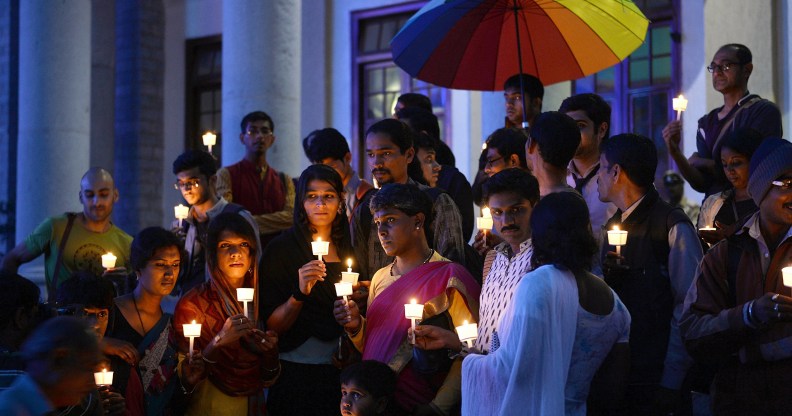Transgender woman ‘stabbed in the face with scissors’ in dispute over £21

Transgender activists and their supporters take part in a candle light vigil held as part of Transgender Day of Remembrance. (MANJUNATH KIRAN/AFP via Getty Images)
Police are investigating the case of a transgender woman in India who was allegedly stabbed in the face after a row over daily earnings worth around £21.
According to a report in the Ahmedabad Mirror, Komal Shrimali, 36, filed a complaint with the Shahibaug police force in the Indian city of Ahmedabad on Monday (13 July).
Shrimali is said to earn her living by begging for alms in different areas of the city, travelling around in an auto rickshaw with her friend, a man named Ranveer Singh.
The complaint filed alleges that Singh attacked her at the end of the day when they were distributing her daily earnings between him and the rickshaw driver.
Singh asked for an additional 2,000 rupees, which is worth around £21 and a substantial amount to many in India. Shrimali refused and the pair began to fight.
In a fit of rage, Singh reportedly pulled out a pair of scissors and stabbed the woman in the face, just below the eye.
The investigating officer of the case, Shahibaug PSI MH Zala, told the paper: “The case has been registered and the hunt for the accused is underway.
“The complainant is currently admitted in a hospital in Girdharnagar, and further investigation in the case is going on.”
The Indian transgender and intersex community are commonly known as hijras and they play an important cultural role, particularly in the northern states.
Begging for alms in public places as Shrimali does is one of the primary sources of income for hijras, as well as sex work and providing an auspicious presence at births and weddings.
Unfortunately, their visibility doesn’t necessarily grant them acceptance. Even though some transgender people have been recognised as ‘third gender’ and granted equal rights, discrimination is still widespread and hijras remain among the most marginalised people in Indian society.
A recent trans rights bill hailed as “wholesome and comprehensive” by lawmakers was condemned as “dehumanising” by the transgender community itself, who fear it does more to infringe their rights than protect them.

